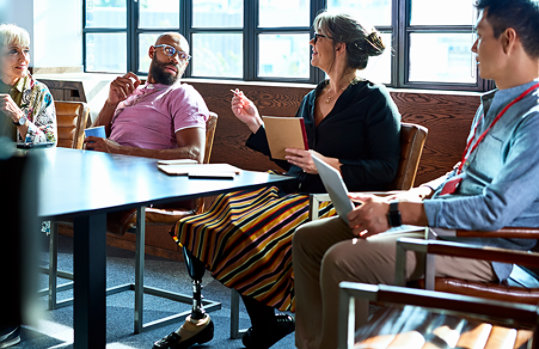Driving impact together

Our grant program
Grantee experience

Funding
Our grants cover costs related to collecting or labelling data, developing models, or other engineering-related work.

Azure & Tech Consulting
We provide Azure compute credits worth $10,000, $15,000, or $20,000, as well as Azure developer support and resources.

Mentoring
We assign a mentor based on your grant topic to help maximize the potential of your project.

Community
You will be included in a supportive community of current grantees and alumni.

Amplification
We provide access to a support platform to craft and share your project more widely.
Grantee projects

Creating the first hiring platform for neurodiversity

Enhancing low-cost refreshable braille display for education

Access to mental health through support in Hindi

Communication for everyone
How to apply
Grant requirements
Application
Eligibility
Frequently asked grant questions
-
Grant applications are reviewed by Microsoft employees who are directly involved in the grant selection process for the sole purpose of proposal review and determining the grant level to be provided. Projects should be developed with or by people with disabilities.
Applications are evaluated on the following criteria:- Relevance: AI and/or other forms of technology (as indicated in the request for proposals) are core to the project success.
- Impact: Your project clearly elevates education, employment, community, or home outcomes for someone with a disability.
- Data: Your team is open to sharing privacy compliant data for future innovation.
- Feasible: The project is achievable within a one-year timeframe. This could be phase 1 of your project, but there should be tangible deliverables completed each quarter that are wrapped up in 12 months.
- Capable: Your team should have the knowledge and skill to deliver the idea, or you should have a plan to partner with someone who can fill in any gaps.
- Sustainable: The project has room to grow beyond the first year of funding.
- Showcase-able: We want to talk about whatever you deliver!
-
To estimate the monetary value of Azure computing resources you need, use the Azure calculator.
For example, if your plan requires 100,000 Cognitive Services Computer Vision transactions, you will need $100 per month for 12 months, totaling $1,200 in Azure credits for the one-year grant period.
-
After each application deadline, applicants typically receive a decision by email within 90 days.
Select projects are invited to pitch their ideas to a selection committee who will score their projects based on the evaluation criteria.
Once projects are selected, part of the award process is to align on project objectives, key results, and scope which are tracked and reported throughout the 12-months grant period. The project work starts with the official Kickoff Meeting with the Microsoft Accessibility Innovation team.
-
Yes. This award program is available worldwide.
-
All IP including background and foreground is solely owned by the grantees. However, we do encourage all our grantees to contribute to and collaborate on open datasets related to your solution.
-
Please make sure to review the criteria and apply for a grant and we will get back to you.
-
There are no official restrictions for indirect costs. However, we do our best to ensure that we maximize the amount of cash that goes directly towards engineering, research, or data collection costs.
For most universities, this means the cash is a gift to the university, but we also sign a collaboration agreement to ensure we are all on the same page with expectations and deliverables.
-
If you have questions about the awards program or the application process not answered in this FAQ, please email us at ai4aques@microsoft.com.
Resources

Five years of progress


